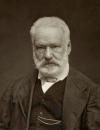Of what does this poor exile dream?
His garden plot, his dewy mead,
Perchance his tools, perchance his team,
But ever of murdered France indeed;
Her memory makes his sad heart bleed.
While those that slew her clutch their pay,
The exile pleads with bitter cry:
One cannot live with bread away;
Afar from home, one's fainhow fain!to die.
The workman sees his workshop still,
And the poor peasant his loved cot;
Sweet homely flowers on the window-sill,
Or the bright hearth (when flowers bloom not)
Smiling on all things unforgot,
E'en flickering on that nook whence aye
His grandmam's bed erst met his eye.
One cannot live with bread away;
Afar from home, one's fainhow fain!to die.
In springtime swarm the honey bees;
Pert sparrows, quick heaven's gifts to share.
Blithe 'mong the barley crop one sees;
Sad little rogues, sans though, or care
They rob, as though they eagles were.
An old-world chateau, ivied, grey,
Crumbles the snug farmstead anigh.
One cannot live with bread away;
Afar from home, one's fainhow fain!to die.
With file and mallet one can live
And keep one's wife and youngster's bright;
One works from faintest dawn till eve,
And in the toil finds true delight.
O sacred labour! life and light!
Our fathers toiled till, wearied, they
Resigned the tools with a smile or sigh.
One cannot live with bread away;
Afar from home, one's fainhow fain!to die.
On holidays, the artisan,
His tools and cares all cheerily stowing,
Singing brave songs which bless or ban,
Cap jaunty on brow, blouse loosely flowing,
Forth to some festal haunt is going.
One eats a rabbit (so they say!)
And quaffs sour wine of Hungary.
One cannot live with bread away;
Afar from home, one's fainhow fain!to die.
On Sundays aye the peasant strong
Sings out for Jeanne or Jacqueline:
"Now sweetheart, quickly come along,
I warrant me, with ribbons fine,
To dance on the hill till stars bright shine."
The sabot hath a tricksy way
Of making music in July.
One cannot live with bread away;
Afar from home, one's fainhow fain!to die.
Mournfully aye the exiles muse,
With spirit,alas! nigh broken down.
Still they regard the darkling yews
That on green peaceful graves still frown.
One dreams of Germany, and one
Of poor bruised Poland, hapless prey,
And one of beauteous Italy.
One cannot live with bread away;
Afar from home, one's fainhow fain!to die.
An exile, tired of hopeless pain,
Lay dying; calm, scarce sad, looked he.
"Why die?" I gently asked him then.
He answered, "Is life sweet to thee?"
Then smiled, "I shall at length be free!
Farewell, I die. O France, for aye
Thee shall the tyrant crucify?"
One cannot live with bread away;
Afar from home, one's fainhow fain!to die.
"I die because I see no longer
The fields, erewhile the world to me.
I die, because I hear no longer
The birds, my whole world's melody.
My soul is where I cannot be.
'Twixt four rough planks my body lay,
And bury me,I care not, I!"
One cannot live with bread away;
Afar from home, one's fainhow fain!to die.






